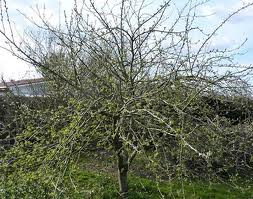
Here at the Funny Farm we've decided to share our love of plants with a wider audience. I get so many requests for help with fruit tree selection and pruning, rose care, and other garden questions that I've decided to make it official: The Funny Farm is now open for business.
I have no plans to charge for helping anyone with garden and tree questions -- I love to talk about it too much to get paid for that. And truth be told this little venture is more of a tax shelter than a real expectation of making much money.
Beginning now, I am offering fruit tree and small ornamental pruning services at very reasonable rates. We will also offer flower and vegetable seedlings in a limited basis later in the spring, as well as garden produce in season.
I'll be posting in the future about all of these services and more, but today let's talk about fruit tree pruning.
There are a lot of people who want to grow their own fruit or may have purchased a house with existing fruit trees but haven't the least idea how to train and care for them in order to ensure maximum tree health and years of optimal fruit production.
Sometimes folks have basic knowledge about pruning and keep meaning to get out and prune their trees, roses, lilacs, and other flowering shrubs but life keeps getting in the way and before they know it, the window of opportunity has passed. Don't let that happen to you this year.
I know what you're thinking:
It's only February... no need to worry about pruning trees until March or April, right? Answer: Yes and No. Pruning Peaches, Nectarines, Apricots, Cherries, and Plums too early can bring on early blooming, so I recommend waiting until the buds are getting fat or even open bloom before pruning these fruits, usually in late March through April. Apples, Pears, Grapes, and Berries can be pruned much earlier. I typically begin work on these four in February. So if you have an Apple, Pear, Grapevine, or Raspberries/Blackberries you'd like help with, now is the time to get on the schedule, because once Peach pruning season hits, it's uncertain if I'll have time to help with these other fruits.
Speaking of peaches, I can't stress enough the necessity of a thorough annual pruning to stimulate new growth which will promote tree health and ensure a plentiful crop of luscious fruit year after year. Not only does fruit production dwindle on neglected Peach trees, but what fruit is produced will often be less flavorful due to inadequate sunlight and air circulation. In addition the health and vigor of the tree suffers, making it more susceptible to disease and insect invasion.
Grapevines put forth 4+ feet of new growth each season, and without careful training and annual pruning grapes can quickly get out of control. Because of this, many people are afraid to plant grapes and miss out on the beautiful landscaping potential of this wonderful fruit. Grapes can be trained on a sturdy fence, wall, or arbor and once established do very well with little to no fertilizer or extra water, producing sweet juicy fruit for decades. With yearly pruning, Grapes are as close to getting something for nothing as it gets!
Raspberry and blackberry canes need pruning as well, and it isn't always as simple as just cutting them off at the ground. There are Summer Bearing raspberry varieties that bear fruit only on last year's canes, and those must be pruned differently than a Fall Bearing raspberry like Heritage. Blackberries are vigorous once established, and require annual thinning and pruning to cut out old wood and keep new shoots coming to ensure good fruit production as well as to contain the plant and make it easier to pick this wonderful fruit. Considering how expensive they are in the stores, I think everyone should have at least a few blackberries and raspberries in their garden.
I can also help with the pruning and care of small ornamentals including roses, lilacs, snowball bushes, and other flowering shrubs. Often neglected due to owners being unsure how to prune, these plants grow healthier and bloom more vigorously with regular renewal maintained by selective pruning of old wood.
To clarify, I am not an arborist. I do not have the equipment, the physical strength, nor the death-wish necessary to perform large tree services or tree removal. There are plenty of folks in the phone book you can call for that. But if you need someone with know-how, passion, and experience in pruning all kinds of fruit producing plants, The Funny Farmer is the one to call.
As always, if you have any questions, you can post them below or contact me directly at 615-9623.



